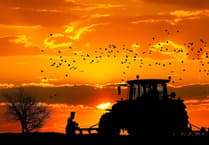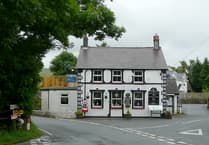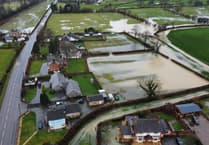Ukrainian student in Aberystwyth Oleksii Gorbatenko recalls hearing loud explosions while writing an essay at 4am at his home in Odesa on 24 February last year.
“I thought it was fireworks,” he said. “Nothing so serious. I looked out the window and saw the whole sky lit up white.
“It was like lightning without a storm.”
In the hours that passed Oleksii, aged 20, and the residents of Odesa would see their lives turned upside down – as Russia’s troops began their full-scale invasion.

Soprano Khrystyna Makar, displaced from her home in Lviv and now living in Tre-Taliesin, spoke about the days that followed, when her husband and many of their friends joined the Ukrainian military to fight.
Many of them are now dead.
“It is emotionally difficult to survive,” she said. “When the young and healthy go, the flower of our nation dies.”

Ukrainian refugees in Ceredigion gathered last week to thank Wales for giving them sanctuary one year on from Russia’s illegal invasion which displaced them from their homes.
The Cambrian News attended an emotional gathering of refugees in Aberystwyth town centre, just off Terrace Road, who wanted to mark the anniversary of the war while paying tribute to those who have helped them.
Ukrainian national anthem sung by soprano Khrystyna Makar
Those in attendance described the county and its residents – who have provided nearly 150 fleeing Ukrainians with homes – as ‘supportive’ and ‘welcoming.’
Russian president Vladimir Putin’s invasion has prompted a disastrous conflict, condemned by the international community, which has displaced more than six million people.
More than 100,000 soldiers are estimated to have died on both sides – along with nearly 10,000 civilians including 500 children.
It has left more than 40 per cent of Ukrainians reliant on humanitarian aid to survive – and caused massive economic damage while destabilising the region.
More than 6,000 refugees have settled in Wales, the Welsh Government says.
Organiser Marta Burak tearfully thanked those who attended to mark the anniversary but insisted it was not a celebration until her nation is free and autonomous.
Marta talks about her hopes for Ukraine's future and thanks the people of Wales
Ms Burak, like so many others in attendance, found herself at Urdd refugee camp just outside Llangrannog after fleeing the war, until she was paired with a Welsh family through the Homes for Ukraine scheme.
“I want to thank the Welsh Government and the people of Wales for the overwhelming support we’ve received,” she said.
“Today there is action, there is a stand, to commemorate the terrible invasion of Russia in Ukraine.
“We stand here to remind those who are still alive to stop the horror and war in the world.
“But there is another aim here. We don’t know all the names of those who have supported us but this gathering is a chance for us to broadcast a big thank you from the bottom of our hearts for supporting us during the hard and dark time of our lives.
“It is a strong belief in our hearts that this horror will one day stop – not only in Ukraine but all over the world.
“We must stop this horror, stop this violence, stop this dictator (Russian president Vladimir Putin) and his mad ideas – so that one day we will live a peaceful life in our motherland. We hope for this and pray for this.”
During the event, Ms Makar, whose voice is renowned across Europe, delivered a rousing rendition of the Ukrainian national anthem – flanked by other refugees, young and old.
The national anthem’s name loosely translates to ‘Ukraine’s glory has not yet perished’ and focuses on the state’s struggle for self-identity and independence.
Ms Makar lives with a host family in Tre-Taliesin near Aberystwyth with her two sons Denys and Lukian who attend Ysgol Penglais. She is hoping to resurrect her opera singing career in Wales, as the Cambrian News reported in November. She is set to sing Ukraine’s national anthem at the Senedd in Cardiff today (Wednesday).
Ukrainian soprano Khrystyna Makar performing at the Senedd
She told the Cambrian News she was grateful for the hospitality she received from the people of Wales who have helped her think positively in dark times.
She said: “I never planned to move to another country. I love my motherland and my life there.
“I only hope that our victory will be as long as possible. My soul hurts for the lost lives of military and civilian people. This is terrible.
“We will persevere and victory will surely happen. It is wonderful that so many countries are helping us. Together with our friends, we are a great force.”
She wants to play her part by popularising Ukrainian music and culture in Wales and continue to teach young singers.
Wolverhampton-born Ceredigion resident Oleh Krawec – raised by an Italian mother and Ukrainian father – struggled to contain his emotion as he recounted the experiences his family from war-torn Lviv have been forced to endure.
“For me the last year has been very hard,” he said. “I speak to my family regularly.
“My nieces and cousins all escaped to Italy with their young children when the war started originally until it was safe to go back.
“I was sent videos of bombs raining down one or two streets from where my niece lived. So, they struggled, it was hard, but life has to go on.
“I don’t want to think about what could happen because I know what can. Within me there is anger but there is also a willingness to want to see peace.
“But it can’t be peace at all costs. It must be a peace where people are left to their country and people can bring up their children and their families the way they want to.
“I want to see Ukraine free. I want to see it have its own culture and its own identity.”
Oleh spoke about the impact Russia's invasion has had on he and his family in Lviv
Aberystwyth-based refugee and aspiring journalist Dzvinka Pohorilets, aged 16, spoke about how she misses her father who remained in Ukraine, near her home of Borodyanka outside Kyiv, to fight against the Russians.
The village is situated near the town of Bucha, where Russian troops are suspected of carrying out horrific war crimes.

She told the Cambrian News: “This year was really difficult for me and my family. To not see my father for one year has been so difficult and I hope the war will end so we can have more lovely times together.
“But even in this difficult time in my life, I still feel love from everyone who has supported us.”
Penparcau Community Forum’s Jenny Jenkins – whose team has drawn praise for their fearless fundraising efforts for those displaced by the war – was also on hand to encourage donations ahead of what will be her ninth aid mission to Ukraine and the surrounding nations.

The UK and Welsh governments, along with many in both nations, will observe one minute’s silence to mark the tragic invasion.
But experts say the war shows no signs of abating, with Russia reportedly planning a major offensive during the anniversary week in an attempt to weaken the resolve of its smaller neighbour.
It is said that Putin believed the war would bring him a swift victory rather than the protracted conflict which has done irreparable damage to his reputation.
Calls for peace have rung out from across Europe but those in attendance in Aberystwyth were defiant that a solution must not come at the expense of the sovereignty of the Ukrainian people, who are supported by almost all western nations. Ukraine is uncompromising that it does not want to cede any of its territory to Russia - including the disputed Donbas region which is majority pro-Russian.
Elsewhere, to mark the anniversary, the Oriel Tŷ Meirion art gallery near Llaneddwyn displayed aspiring artist Darya Bandurka’s work which emulates the traditional Petrykovsky painting technique of folk art that preserves the customs of decorating Ukrainian homes.

Ms Bandurka, aged 16, left her home in Dnipro and travelled to the UK with her parents, aunt and little twin sisters and are now staying with a host family.
She said: “No one could believe that such events could happen in our time. They came to kill us.
“We pray for the victory of Ukraine! We are very grateful to all countries that support Ukraine.
“The worst thing is to lose loved ones. My great-uncle died in the war, volunteering to defend our country.
“Some of my relatives live in the territories that were under occupation, some relatives went abroad.
“My godfather, on the last day before the occupation, miraculously took the family out of (Russia-occupied) Irpin, where they lived.
“My grandparents live in the Sumy region, where the occupying forces also committed genocide.”
The region was one of the major theatres of war in the early stages of the conflict and resulted in the withdrawal of Russian troops in an embarrassing defeat for Putin.
She thanked her Gwynedd-based hosts for providing her family with a home. She says that, on arriving, her three-year-old sister said she was happy she would not have to run down to the basement when the sirens go off like she did at home.
Business management student Oleksii, on an exchange programme at Aberystwyth University until June, usually lives across the road from a military base in Odesa.
Fellow Odesa National University student Maryna Zaitseva, who joined Oleksii at Aberystwyth on the programme, says she and her family had to hide in a bomb shelter every day and every night for two months at the beginning of the conflict.
“Sometimes we were very nervous and sometimes we’d just cry and feel emotional,” she said.
“When I visited recently the whole city was dark, completely dark – I couldn’t see anything. Sometimes you only get electricity at night and so you’re without WiFi and hot water most of the time.
“But even when I am here I am always nervous because something can happen to my family anytime. I call them all the time. This is the life of a Ukrainian – everyone can be in danger no matter where they are.
“But I want to thank people in Wales. When I see Ukrainian flags it’s so important and helps us cope.”
One of the boys she knew from Odesa died while stationed on a war ship – but until recently it was suspected he had been taken prisoner by Russia.
Oleksii’s family have also remained in their home on the outskirts of the city, spending many days sheltering in an underground bunker. They too endure regular power outages and disruptions to basic necessities such as energy and water.
“We were all living in fear and the air raid alarms go off and you hear the explosions and you don’t know how close they are when it happens all the time,” he said.
“But to be honest, the war has already been going on for eight years since 2014 and a year ago it became a full invasion – so I don’t think it will end very soon.”
He questioned those marking the anniversary and asked: “Why do you celebrate invasion? It’s very strange to do this because tens of thousands of Ukrainians have died.”
Though he is enjoying his time in Aberystwyth, he told the Cambrian News life is not easy for anyone connected with Ukraine. He says the Ukrainian people cannot escape the fear, anxiety and anger caused by the war – no matter how far away they travel.
“I am always concerned. I speak with my grandma on the telephone everyday to check she is fine.”
Both were unequivocal that Western nations had greater capacity to support Ukraine militarily – and called on them to do more.
“I think Ukraine will win but we need time for this,” Maryna said. “And we need resources because we really haven’t enough. We need to make sure Russia won’t do this again.
“But Ukraine won’t give up. There is no compromise. We can’t lose so many people and then lose our territory too.
“No. It is our territory, our people and our culture.”




